Why Is My Cat Acting Weird After Shots?
Have you ever wondered why your cat is acting weird after shots? Your cat is experiencing some side effects from the vaccine. Decreased appetite, lethargy, slight fever, vomiting, and mild discomfort are the common signs of side effects from vaccination. This is normal, and symptoms may last 2-3 days.
So, after taking shots or vaccines, your cat may not act its usual self. Just like with any medication, there is always the potential for side effects, and vaccines are no different.
But, whatever the reason, if your cats are acting weird after getting vaccinated, keep an eye on them and consult with your veterinarian if you have any concerns.
Read Also:
How Common Are Vaccine Reactions In Cats?
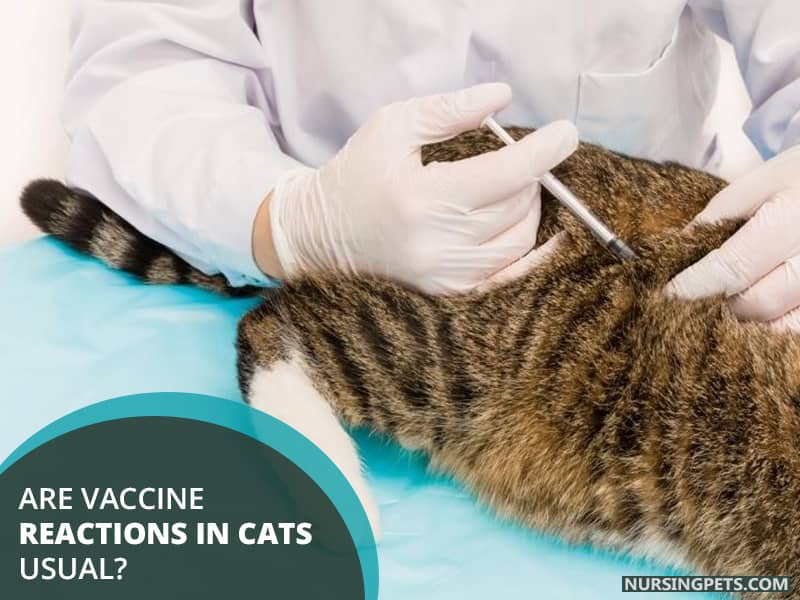
Vaccine reactions are rare in cats but can occur. The most common vaccine reactions are mild and may include a temporary decrease in appetite, lethargy, and mild fever. More severe reactions are rare but can include anaphylaxis (a severe allergic reaction) and facial swelling.
How Do You Tell If Your Cat Is Having A Reaction To A Vaccine?
In case your cat is reacting to a vaccine, there are a few things you can look for. First, check to see if your cat displays any discomfort or pain. If your cat is crying or meowing excessively or holding its paw or body in an unusual way, these could be signs that it is in pain.
You should also check for any swelling, redness, or discharge around the injection site.
Do Cat Vaccinations Have Side Effects?
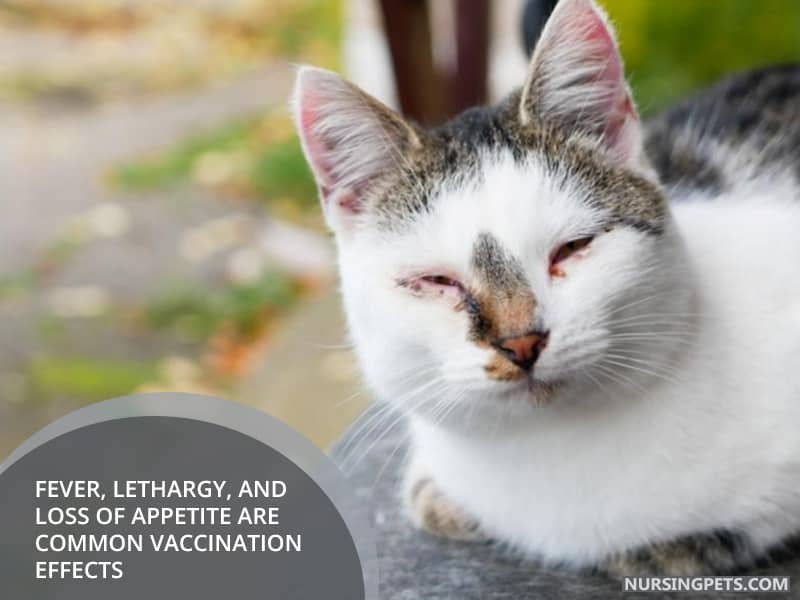
As with any medication, there is always the potential for side effects with vaccinations. The most common side effect that is seen with cat vaccinations is a mild fever. This is typically seen within the first 24 hours after the vaccination is given and usually resolves itself within a day or two.
What Are The Side Effects Of Cat Vaccination?
Vaccinating your cat is an essential part of preventing them from developing serious illnesses, but as with any medical procedure, there is always a small risk of side effects.
The most common side effect of cat vaccination is a mild fever, which usually lasts for one or two days and is nothing to be concerned about. However, in rare cases, more severe side effects can occur.
Some side effects of cat vaccination:
- Severe swelling at the injection site
- Hives
- Difficulty breathing
- Collapse
- Excessive bleeding
- Persistent vomiting or diarrhea
- Seizures
- Behavioral changes
Most side effects from cat vaccination are mild and will resolve on their own.
How Long Do Cat Vaccine Side Effects Last?
Have you ever wondered how long cat vaccine side effects last? As we have mentioned before, just like with any medication, there are potential side effects when your cat is vaccinated. However, it’s important to remember that these side effects are usually mild and temporary.
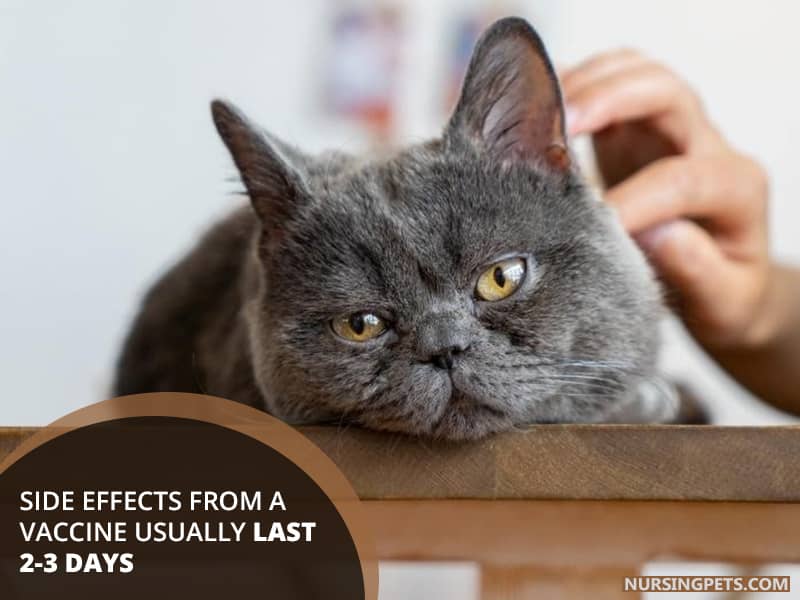
The most common side effects of cat vaccines are soreness and swelling at the injection site. These side effects are usually short-lived and should resolve within a few days. In some rare cases, more severe side effects have been reported. These can include fever, lethargy, and anorexia.
It’s also important to keep in mind that even if your cat does not experience any side effects from their vaccines, it may still be contagious for a few days afterward. So, it’s important to keep them away from other cats during this time.
What To Do If Your Cat Is Acting Weird After Shots?
Is your cat acting weird after shots? There are a few things you can do to help them feel better. First, make sure they have a quiet, comfortable place to rest. You can also offer them some food and water, but avoid giving them too much at once.
When they seem to be in pain, you can give them a small amount of over-the-counter pain medication.
How Can I Make My Cat Feel Better After Shots?
For vaccinated cats, there are some things you can do to help them feel better. Follow these steps, and your cat will be back to its normal self in no time.
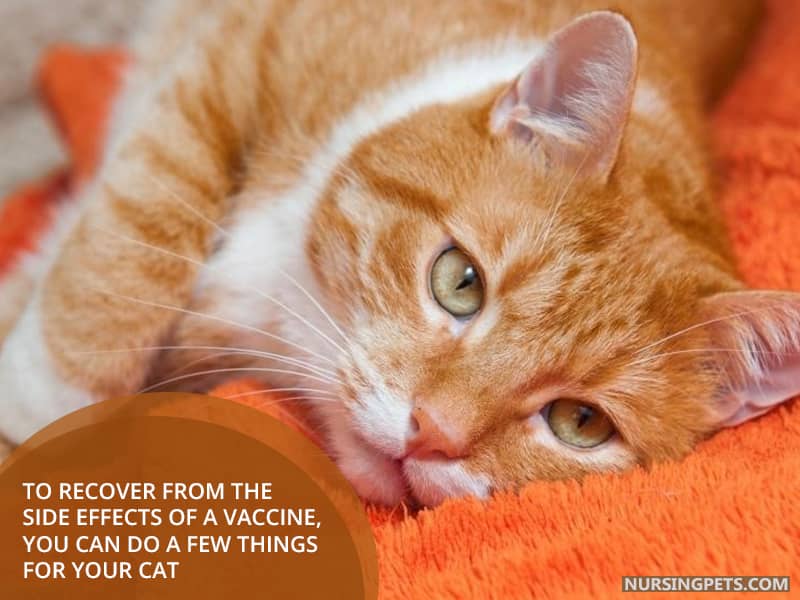
Give them time to rest
After vaccination, your cat will need some time to rest. Let them sleep and relax in their favorite spot. They may not want to eat or drink straight away, so don’t worry if they don’t.
Offer them some food
Once they’ve had some time to rest, offer them some of their favorite food. If they’re not hungry, don’t force them to eat. Just leave the food out, and they’ll eat when ready.
Give them plenty of TLC
Your cat will appreciate some extra TLC after their vaccination. Spend some time stroking and cuddling them. They may not want to be left alone, so try to keep them company as much as possible.
Keep an eye on them
It’s normal for your cat to be a bit tired and sleepy after a vaccination. But if they seem unusually quiet or lethargic, or they’re not eating or drinking, contact your vet for advice.
Following these steps can help your cat feel better after their vaccination.
Cat Vomiting After Vaccines
Vaccines are an important part of keeping your cat healthy, but sometimes they can cause side effects like vomiting. If your cat vomits after getting vaccinated, it does usually not cause alarm. Here’s what you need to know about why it happens and what you can do to help your cat feel better.
The most common vaccine-related side effect in cats is vomiting. It occurs in about 5-10% of cats that receive vaccines. The good news is that most cats recover quickly and don’t experience any long-term effects.
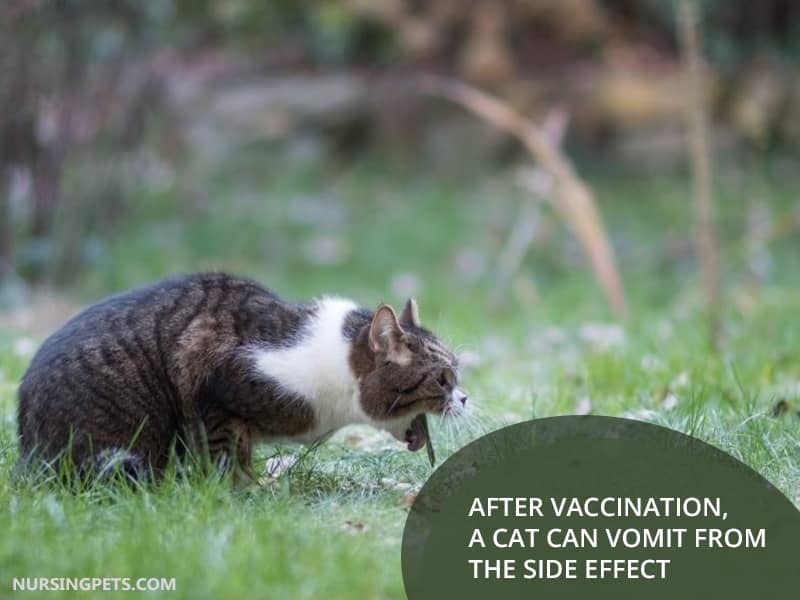
There are a few reasons why your cat may vomit after being vaccinated. The vaccine itself can cause an upset stomach. In addition, the stress of the vet visit can sometimes trigger vomiting. If your cat has a sensitive stomach, he may also be more likely to vomit after getting vaccinated.
When your cat vomits once or twice after being vaccinated, it usually does not a cause of concern. He should recover within a day or two.
Cat Distemper Vaccine Side Effects?
Cat distemper is a viral infection that can be deadly to cats. The virus is spread through contact with infected saliva, mucus, or feces and can easily infect kittens and cats that are not vaccinated.
However, as with any vaccine, there are potential side effects that you should be aware of. The most common side effect of the cat distemper vaccine is a mild fever. This is typically short-lived and will resolve on its own within a few days.
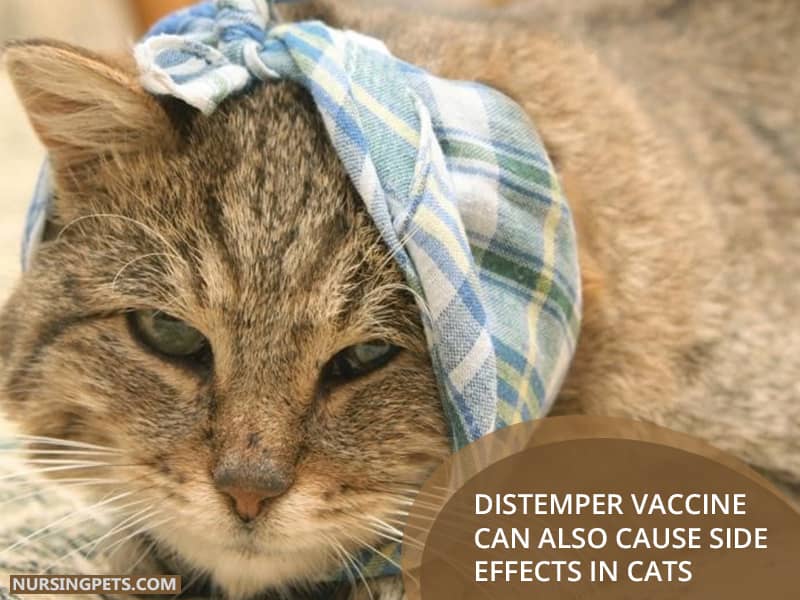
Other potential side effects include lethargy, loss of appetite, and vomiting. These side effects are also typically short-lived and should resolve within a few days.
In very rare cases, more serious side effects have been reported. These include seizures, facial paralysis, and even death. If you notice any of these side effects in your cat after vaccination, please contact your veterinarian immediately.
Overall, the cat distemper vaccine is safe and effective. The risk of your cat contracting the virus is much greater than the risk of side effects from the vaccine.
Does Distemper Shot Make Cats Tired?
Many cat owners report that their cats seem to be more tired after getting a distemper shot. This could be due to the fact that the vaccine is designed to stimulate the immune system, and the body may need some extra rest to recover from this.
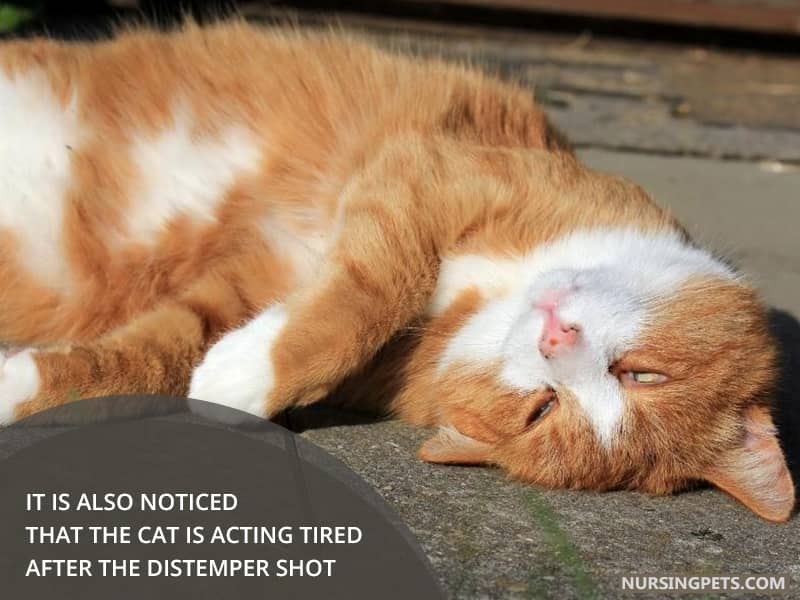
Additionally, the injection itself can be stressful for some cats and may also contribute to fatigue. However, when your cat seems unusually tired after getting a distemper shot, it is generally nothing to worry about, and they should return to their normal energy level within a day or two.
Side Effects of Rabies Vaccine in Cats
Rabies is a potentially fatal virus that affects the nervous system of mammals. Cats are susceptible to rabies and can transmit the virus to humans and other animals. While the risk of contracting rabies from a vaccinated cat is low, owners should be aware of the potential side effects of the rabies vaccine in cats.
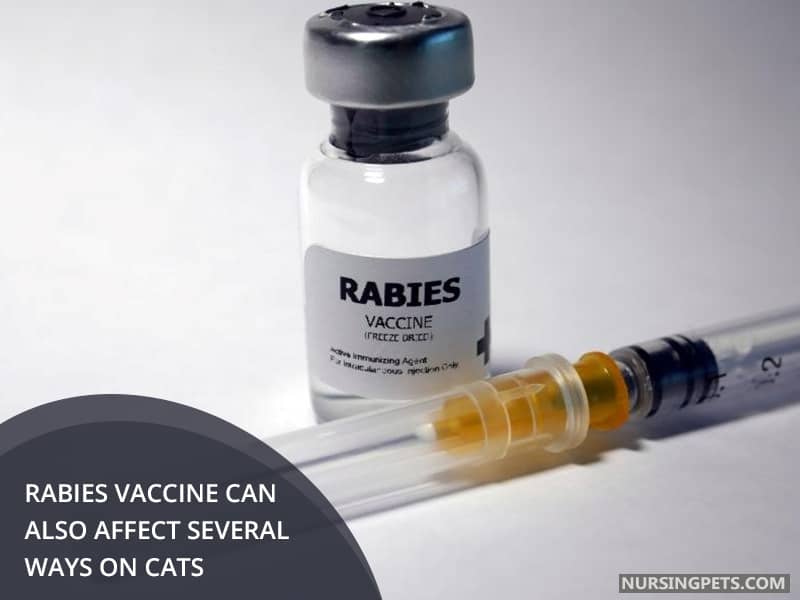
The most common side effect of the rabies vaccine in cats is a mild, temporary reaction at the injection site. This may include swelling, redness, or soreness. In some cases, cats may also experience fever, lethargy, and loss of appetite. These side effects are typically short-lived and resolve within a few days.
In rare cases, more serious side effects can occur. These may include seizures, paralysis, and inflammation of the brain.
Cat Vomiting After Rabies Vaccine
In case your cat has ever vomited after a rabies vaccine, you’re not alone. In fact, it’s one of the most common side effects of the vaccine. While it may be alarming, it does usually not cause concern.
The rabies virus is deadly, and the vaccine is the best way to protect your cat from it. The vaccine works by stimulating the immune system to produce antibodies that fight the virus.
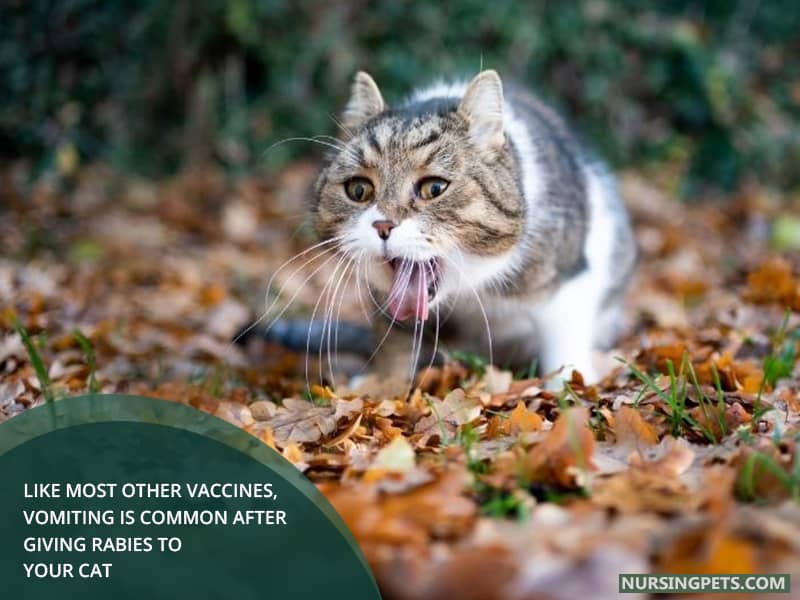
In some cases, the immune system reaction can be so strong that it causes vomiting. This is more likely to occur in kittens and young cats, as their immune systems are not yet fully developed.
If your cat vomits after a rabies vaccine, it’s important to keep an eye on them and make sure they’re staying hydrated.
Cat Died From Rabies Vaccine
With great sadness, we are telling you that our beloved cat, Fluffy, has passed away from complications related to the rabies vaccine. Fluffy was always such a sweet and loving cat and will be dearly missed by all of us.
Rabies is a deadly virus that can be spread to humans through the bite of an infected animal. While the rabies vaccine is highly effective in preventing the disease, there is always a small risk of complications.
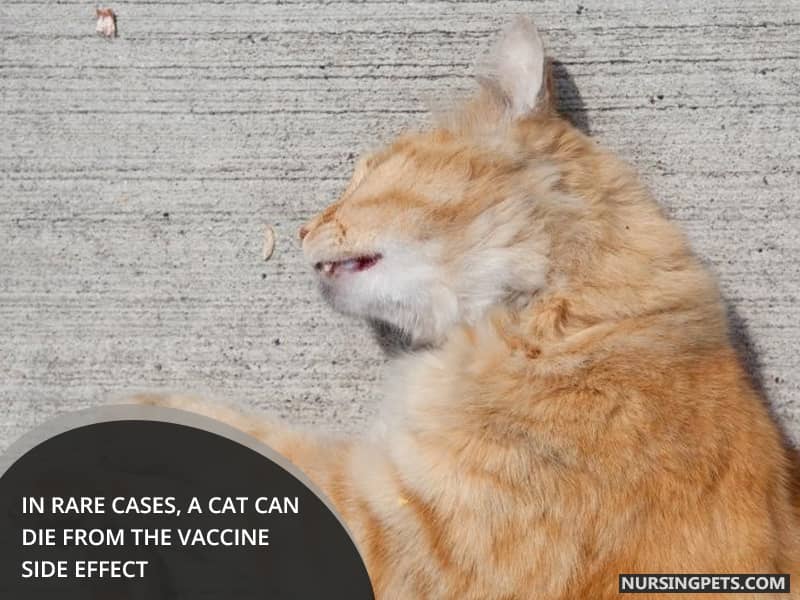
In Fluffy’s case, she suffered an allergic reaction to the vaccine, which led to swelling of her airway and difficulty breathing. Despite our best efforts to get her the help she needed, Fluffy sadly passed away.
We want to remind all pet owners to be aware of the risks associated with the rabies vaccine and to consult with their veterinarian before vaccinating their pets.
While the risk of complications is low, it is important to be aware of the potential risks. Our hearts go out to all who loved Fluffy, and we hope that her story will help raise awareness of the importance of rabies prevention.
How Long Are Cats Lethargic After Rabies Shot?
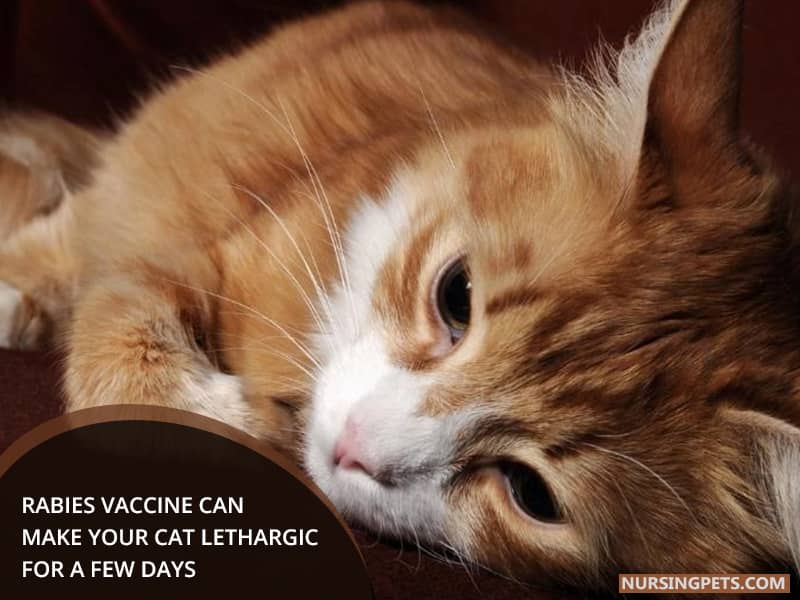
Cats that have been vaccinated for rabies are not immediately immune to the virus. It takes approximately two weeks for the vaccine to become fully effective. During this time, cats may be lethargic and have a reduced appetite. These side effects are usually mild and resolve within a few days.
Is It Normal For My Cat To Be in Pain After A Vaccine?
It is normal for your cat to experience some pain and soreness at the injection site after receiving a vaccine. This is because the vaccine is injected into the muscle, which can cause some inflammation and discomfort. Most cats will recover quickly from this and should not experience any long-term effects.
Why Is My Cat Sleeping So Much After Shots?
In case your cat is sleeping more than usual after getting shots, there’s no need to be alarmed. It’s perfectly normal for cats to sleep more when they’re feeling under the weather. When your cat’s immune system is working hard to fight off an infection, she’ll need more rest to recover.
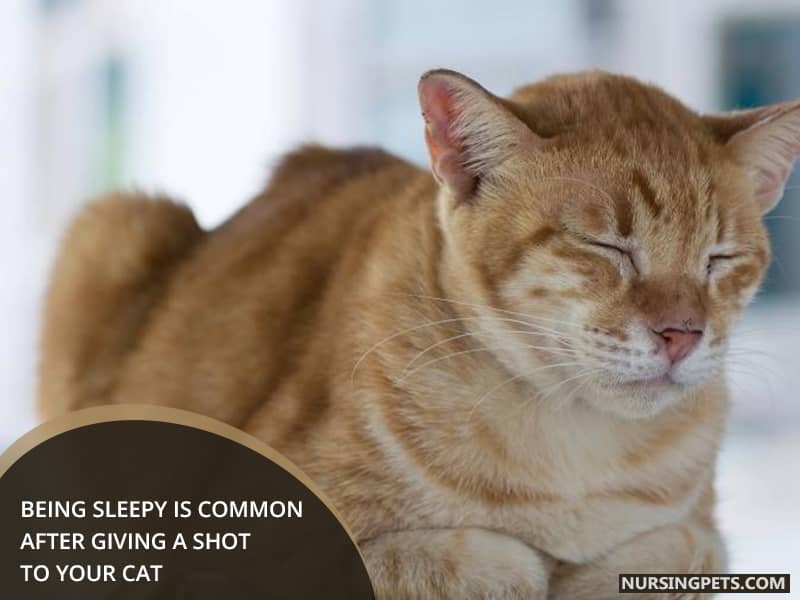
So, if your kitty is sleeping a lot after her shots, it’s a good sign that her body is doing what it needs to do to heal.
Final Word
Your cat may be acting weird after shots because they are in pain. Cats are notoriously good at hiding pain, so it’s important to be observant after your cat has had any kind of vaccine shot.
In case your cat is acting weird after shots, watch for signs of pain such as yowling, avoidant behavior, or difficulty moving. When you notice any of these signs, take your cat to the vet to be sure they are not in pain and to get any necessary treatment.
Image Source: Canva.com/photos


